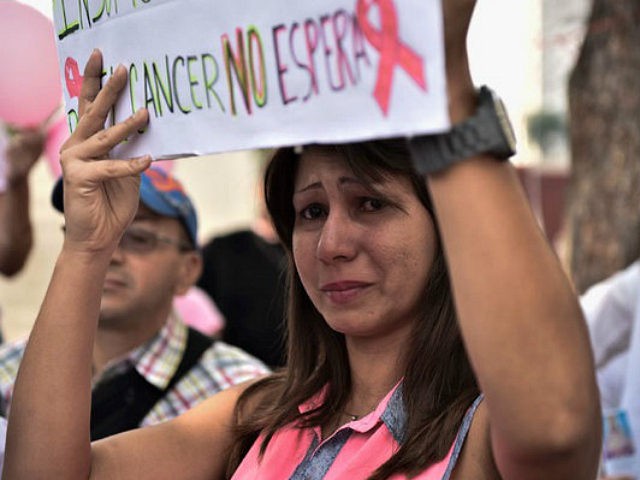Breast cancer patients in socialism-ravaged Venezuela are demanding that the Venezuelan Institution for Social Security, which provides health care, provide them access to better quality medication. They claim the Cuban-made drugs they have been taking come with a host of side effects, including intense pain.
The Venezuelan newspaper El Nacional highlights a petition signed by oncology patients in the country and addressed to the Social Security agency. In Venezuela, the socialist constitution of 1999 classifies health care as a human right, which allows the government to fully control the medical industry as a means of allegedly providing universal care.
“We women diagnosed with breast cancer write you this report to explain the situation we find ourselves in due to the medical shortages,” the letter reads. “With concern, we turn to you for answers to the actions we have taken individually, requesting medication to complete our medical protocol.”
The women write that many of them have had to abruptly stop receiving ongoing cancer treatments, leaving them weakened by both the cancer and the cure. “Since last year, we lack medication, and when we cut short our treatments the consequences are worse than when we were first diagnosed with the disease,” they write. “These are not treatments for which there are alternatives.”
Of the little medication they do have access to, the women have complaints. They particularly mention Zometa (zoledronic acid), used for treating hypercalcemia in cancer patients with tumors. “Zometa is a bone protector and [yet] whoever uses the Cuban medication spends up to fifteen days with their bones ravaged,” the letter reads.
The Cuban government prides itself on its medical resources, using doctors to barter for goods with other countries or simply selling their free services to fill Havana’s coffers. It has received much promotional aid from the international left, from filmmakers to activists, in advancing its use of medical “diplomacy.” 2014 estimates suggested that Cuba had made nearly eight million dollars through what doctors who experience it call a “slave trade,” sending doctors on minimal living stipends to do complex medical work in countries allied with Cuba.
That same year, Venezuela shipped 100,000 barrels of oil to Cuba a day. For years, Venezuela has provided Cuba with oil. The Venezuelan government denies that they are trading oil for doctors, instead claiming that the Cuban medical presence in Venezuela is the product of Cuban communist generosity and the “free” Venezuelan oil a product of Bolivarian Socialism’s embrace of Latin American brotherhood.
This is not the first time that Venezuelans have protested the lackluster quality of Cuban medicines. The Venezuelan Pharmaceutical Federation (Fefarven) objected in 2013 to the lack of sanitary standards in the production of Cuban communist medications, as Havana refused to abide by international standards of regulation. “We are having a problem because products that have not been inspected for sanitary approval are being distributed,” Fefarven head Freddy Ceballos warned at the time.
By the end of 2016, Ceballos was warning of a full-fledged “humanitarian emergency” in the country, as Venezuela failed to secure inventory on most of the medications the World Health Organization (WHO) considers necessary for a functional health care industry.
Hospitals lacking in ibuprofen and complex cancer and HIV drugs began requesting that patients bring their own. The number of amputations and unwanted pregnancies – caused by a lack of antibiotics and birth control medication – began to skyrocket.

COMMENTS
Please let us know if you're having issues with commenting.